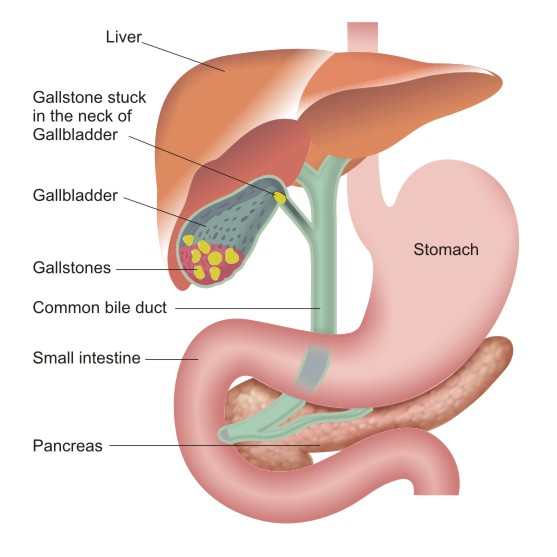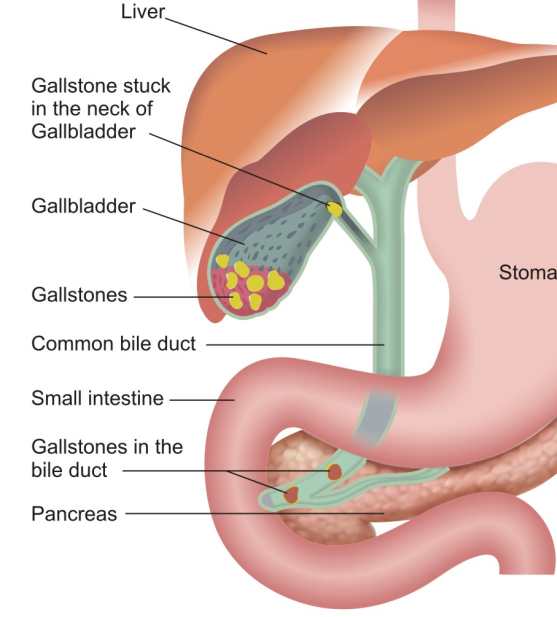Gallstones are stones that form in the gallbladder. The gallbladder is a small sac attached to the liver that stores bile between meals. The gallbladder draws water from the bile making it more concentrated. During a meal (especially fatty food) the gallbladder squeezes the stored bile into the intestine to help with digestion. 
Why do gallstones develop?
It is not very clear, but some main reasons are:
- Bile in the gallbladder becomes too concentrated, leading to precipitation of salts (cholesterol or pigments).
- The gallbladder does not empty completely and properly.
What are the risk factors?
- Gender (more women than men develop gallstones)
- Advancing age
- Family history of gallstones
- Obesity
- Pregnancy and birth control pills
- Rapid weight loss
- Diabetes
What are the types of gallstones?
- Cholesterol stones
- Pigment stones
- Mixed stones
Regardless of the type, stones cause problems in the same way.
What are the symptoms of gallstones?
- No symptoms. 7 out of 10 people with gallstones will not experience any symptoms.
- Biliary colic: Pain is the most common symptom, typically in the right upper abdomen radiating to the right shoulder blade or back, often triggered by fatty foods.
- Complications
What are the complications of gallstones? 
- Acute cholecystitis: Inflammation and infection of the gallbladder due to stone blockage and repeated colic attacks. This requires hospital admission, IV antibiotics, and usually surgery. Surgery is usually performed during the hospitalisation or shortly after. If untreated acute cholecystitis can lead to the rupture of the gallbladder.
- Bile Duct Obstruction; this occurs when a stone slips from the gallbladder into the main bile duct. This can lead to:
- Jaundice: yellowish discolouration of the skin and eyes.
- Acute cholangitis: this is a life threatening infection in the bile ducts. It requires immediate treatment.
- Acute pancreatitis: inflammation of the pancreas due to the irritation caused by the stone in the bile duct. It can be life threatening.
How are gallstones diagnosed?
In addition to blood tests, an ultrasound is the most common test performed. It is a safe and highly accurate test. Other tests such as MRI, CT scan and endoscopy are sometimes performed if there is suspicion of other conditions or if there is a chance of stones slipping into the bile ducts.
If the stones are picked up by chance and are not causing any symptoms then watchful waiting is all that is needed. However, once gallstones start to cause symptoms then surgery is recommended.
Diet Tips for Gallstone Sufferers
If fatty foods trigger your pain attacks, avoid those specific ones. A low-fat diet won't dissolve gallstones but can help reduce attack frequency and intensity. Try these practical steps:
- Eat smaller portions. Only eat when truly hungry, and stop when full.
- Focus on plant-based foods. Cut back on meat.
- Choose fish or chicken over red meat, which has higher fat.
- Skip full-fat dairy and eggs.
- Stick to home-cooked meals where you control ingredients. Avoid processed options.
- Trim all visible fat and skin from meat before cooking.
- Cook veggies and meat by boiling, steaming, grilling, baking, or shallow-frying in non-stick pans. Avoid deep-frying or rich sauces.
- In baking, swap half the butter for fat-free yogurt.
- Check food labels and pick low-fat versions.
- Limit oily items like deep-fried snacks or cheesy meals.
Managing a Gallbladder Pain Attack
For mild biliary colic, take paracetamol or ibuprofen (if no allergies or asthma) along with an antacid like Gaviscon or Pantoprazole. Buscopan can also provide relief (you can get it from the chemist without a script). Seek urgent medical care if pain starts severe or doesn't improve with these.
What is a Cholecystectomy?
This is the surgical removal of the gallbladder and the stones in it. It is almost always performed laparoscopically (key hole surgery) and patients get to go home 1 day after surgery. However, if key hole is considered unsafe or impossible then the surgery may need to be completed with a longer incision beneath the right ribs and the patient will need a longer hospital stay of about 6 days. Gallstones that have slipped into the bile duct may need to be removed endoscopically (ERCP) either before or shortly after surgery.
But, Don't I need my gallbladder?
People that have had their gallbladder surgically removed live perfectly well without it. Bile will continue to be produced by the liver and help digestion. Your quality of life will not be affected.










